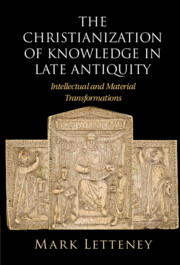‘In The Christianization of Knowledge in Late Antiquity, Mark Letteney offers a profoundly new and powerful analysis of late ancient intellectual life. He argues that a new model for social authority gave rise to a new form of argument, whose prestige status shaped developments across disparate fields of inquiry, from theology to law and far, far beyond. It’s a book with a thesis, and it deserves to be read and debated by anyone interested in late antiquity.’
Clifford Ando - University of Chicago
‘This daring synthesis explores a change almost too big to be seen. Letteney shows how the Christian search for certitude in matters of theology spilled over in the fourth and fifth centuries to affect other disciplines - Roman law, Greek philosophy, even rabbinic argument. The result was a new cultural ideal that attempted to press from an exuberantly diverse ancient heritage the pure, translucent honey of universal truths.’
Peter Brown - Princeton University
‘Mark Letteney’s book approaches the question of the rise of Christianity in the late Roman Empire through a new perspective: not the more traditional one of Christianizing people, doctrinal controversies or demographic changes, but that of knowledge structures. The book is characterized by a particularly careful exegesis of the sources and a very extensive comparison with the earlier literature. It stands out for its great originality and is an uncommon example of how productive research in Late Antiquity can be given the aptitude for capturing the echoes that can come from texts of diverse origins.’
Lucio De Giovanni - Università di Napoli Federico II
‘The Christological convulsions of the fourth century did more than establish Nicaea as the index of orthodoxy. They changed how knowledge was generated. They changed how texts were deployed and read. They changed the nature - and the physical format - of the book itself. The Christianization of Knowledge in Late Antiquity reconstructs this revolution in reading practices and politics, a revolution that affected jurists and rabbis no less than bishops and emperors. In tracing how shifts in book forms led to shifts in thinking, Mark Letteney offers nothing less than a new means to measure how Christianity profoundly altered the culture of late antique Rome.’
Paula Fredriksen - Boston University
‘Letteney’s remarkable new book charts the impact of Christianity not on religion or institutions - the focus of so much work on early Christianity - but rather on the organization of knowledge and the production of meaning in Late Antiquity. Drawing on a range of specialized texts (law codes, technical and bureaucratic treatises, military handbooks, and so on), he demonstrates that the particular forms of meaning-making that emerged in the context of theological and doctrinal dispute became broadly generalized in late-antique thought, and could be found in everything from the writings of the jurists to the Palestinian Talmud. A compelling and sensitive new sociology of knowledge, The Christianization of Knowledge in Late Antiquity will be required reading for students of early Christianity and the cultures of Late Antiquity, and will also be of interest to everyone working on the production of knowledge in premodern societies more generally.’
Carlos F. Noreña - University of California, Berkeley
‘… a significant piece of scholarship … Scholars of late antiquity, knowledge production, Christianisation, Roman law, and many other topics will find much food for thought.’
Christian Thrue Djurslev
Source: Bryn Mawr Classical Review



